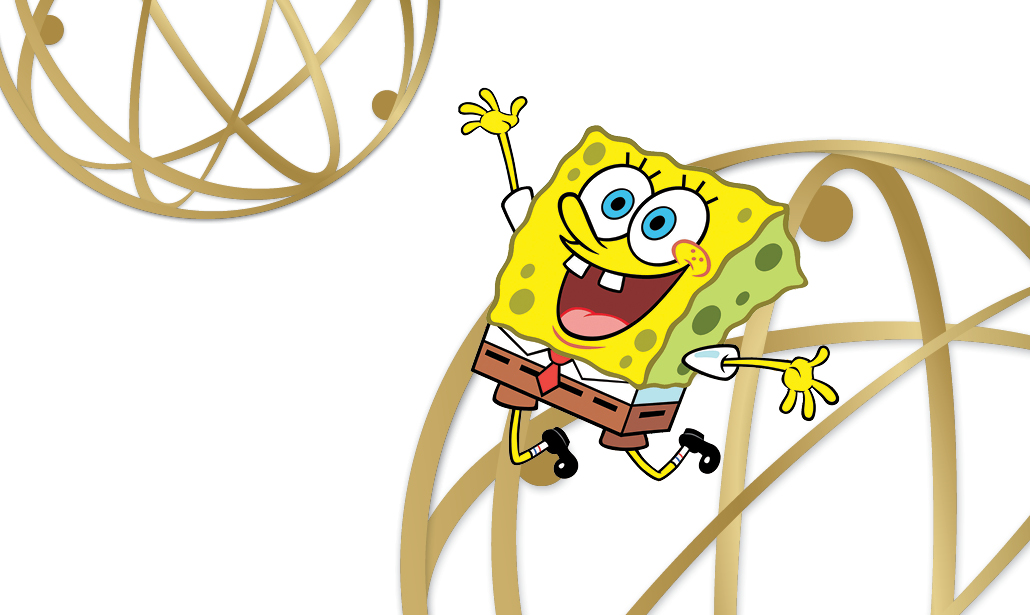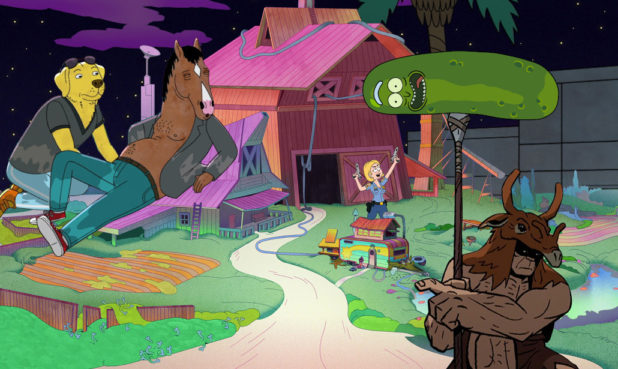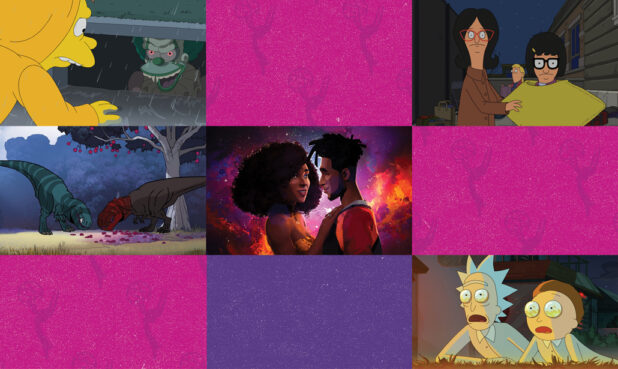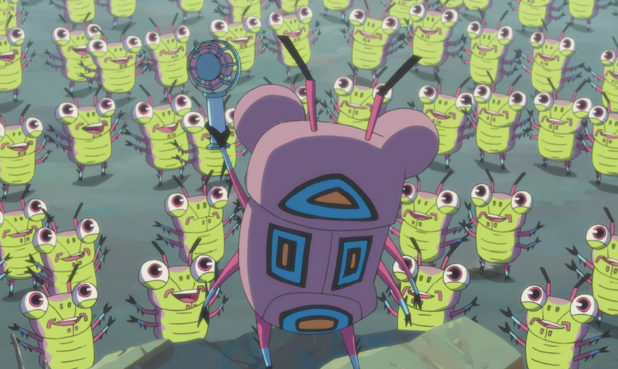When William Hanna and Joseph Barbera pitched The Flintstones to TV networks in 1960, the duo’s creation was something that had never been done before: an animated primetime series. While inspired by The Honeymooners, their Stone Age-set sitcom had much more than marital humor. It had a visual language that could only be captured via animation.
“The Honeymooners had a lot of dialogue, but it was their expressions and [Art] Carney’s attitude that made it work,” Barbera once told the Television Academy. “Well, when you’re doing an animation thing, you better go beyond that. You can’t just have two people making faces at each other. You have to move them.”
The Flintstones more than moved people, it created its own world full of rich characters, beautiful imagery, and prehistoric puns that delighted both children and adults. The Flintstones was the first animated series to be nominated for an Emmy—in 1961, before there was even a category for animation.
Explains Television Academy senior vice president John Leverence, the field at the 13th Emmys ceremony was wide. “The Flintstones was nominated in the Outstanding Achievement in the Field of Humor category along with a sitcom (Andy Griffith Show), a hybrid variety-sitcom series (Jack Benny Show), a variety special (Bob Hope Buick Show), and a structured reality show (Candid Camera) —quite a hodge-podge.”
It wasn’t until 1979 that the Television Academy created a category to honor animated programs, and nearly three decades later it created one to honor short-form animated programs.
“What makes great work? Fantastic storytelling, compelling visuals, and touching the heart of the viewers in a way that is genuine and captivating,” says Academy Governor and TAG member Jill Daniels, “The Academy historically champions work that is groundbreaking and innovative in medium and content. That is a golden thread that runs through Emmy-winning animated programming created at any time for audiences of all ages.”
Through that lens, we look back at eight Emmy-nominated and -winning TV animated series.
The Flintstones (1960-66)
Emmys Cred: 1 nomination (Outstanding Program Achievement in the Field of Humor, 1961)
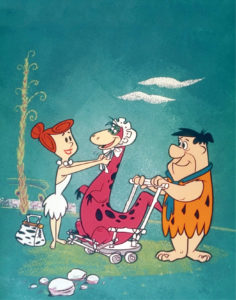 Photo by ABC Photo Archives/ABC via Getty Images.
Photo by ABC Photo Archives/ABC via Getty Images.Much like The Honeymooners, this classic animated sitcom followed two couples as they navigated the complexities of life (in the Stone Age instead of the 20th century).
“The idea of taking this old-fashioned working-class family—which, by the way, Roseanne is getting all this attention for its reboot now—and turning that into an animated show in prehistoric times was really quite clever. That was an important moment,” says Robert Thompson, Director of the Bleier Center for Television & Popular Culture at Syracuse University. “The Flintstones managed to slip in [to the Emmys] before there was even a category — which was ahead of its time, and I think that’s exactly where it belonged. The Flintstones was in fact a sitcom that happened to be animated. It was not just a kiddie show.”
The Simpsons (1989-present)
Emmys Cred: 16 nominations and 10 wins in the Outstanding Animated Program category alone (from 1990 to 2017); an additional 22 wins and 41 nominations in other categories

After debuting as a series of shorts on The Tracey Ullman Show in 1987, Fox commissioned a series that would focus solely on what longtime background designer Deborah Peterson calls “a plain old ordinary, nuclear family.” Says Peterson, who began working on the first season of the show straight out of college: “They may have the most ridiculous adventures, but at the core it is just a family living in middle America. They’re not super poor, they’re not super rich, they go to church, they go to school, they go to work, they take care of the house, they have dogs, they know their neighbors.”
The Simpsons’ appeal also owes to the fact that the writing is layered for audiences of all ages.
Says Syracuse University’s Thompson, ”A little kid could like The Simpsons because Bart said things like, ‘Underachiever and proud of it,’ and a PhD in comp literature could enjoy [it] because of its complex literary and political references.”
While The Simpsons’ influence can be seen in the many adult-oriented and pop culture-savvy animated shows that followed, it is also itself a prime example of how TV animation has changed in the past three decades. Every job on the show has gone through a process evolution from analog to digital, and the level of detail in each frame continues to increase as the years go on.
Batman: The Animated Series (1992-95)
Emmys Cred: 1 Primetime win (Outstanding Animated Program, 1993); 3 Daytime wins and 9 more nominations
This take on the caped crusader’s adventures took inspiration from Tim Burton’s 1990s Batman movies for a slightly darker, noir-esque series that geek haven website IGN.com voted the best non-comics version of the character. Peter Ferk, who worked on the series as the overseas background layout supervisor, says it still inspires his work today.
“When I look back at some of my drawings … there’s something about the look of the show that changed my natural drawing style. When I’m drawing human characters a lot of Batman still jumps through,” he says. “The designs were fantastic and the storylines were so different.”
Plus, like The Flintstones and The Simpsons, it too appealed to people of all ages.
“All of a sudden when they started airing it on Fox it cut right across all the demographics,” he says. “It became one of the shows where the parents were engrossed just as much as the kids.”
The Powerpuff Girls (1998-2005)
Emmys Cred: 2 Outstanding Individual Achievement in Animation wins (2000 and 2005); 3 Outstanding Animated Program nominations
The three super-powered sisters from Townsville starred in their own series on Cartoon Network in the late ‘90s and early ‘00s, which spawned a feature film, a Japanese remake and a 2016 reboot. Chris Battle, who worked as a character designer on the original series, remembers being excited that, while in the early stages of his career, he was able to work on a show as good as The Powerpuff Girls. “It wasn’t … doing something based on some toy that you didn’t care about. We were all deeply excited to be working on shows of quality like that,” he says.
Robert Alvarez, a veteran animator and director who wound up working on both the original and the rebooted versions, liked how different the series felt—and how funny it ended up being. “I really liked it because I thought the show was really different, new,” he says. “It was a lot of fun to go to the storyboard pitches, because some of the people that worked on the original series were very, very funny.”
But Thompson says one of the show’s most important contributions was that it showed girls they could be superheroes too. “It did kind of give a vocabulary to the whole idea of girl power, which was significant. You had these little girl superheroes,” he says, adding, “we didn’t see a lot of that back then.”
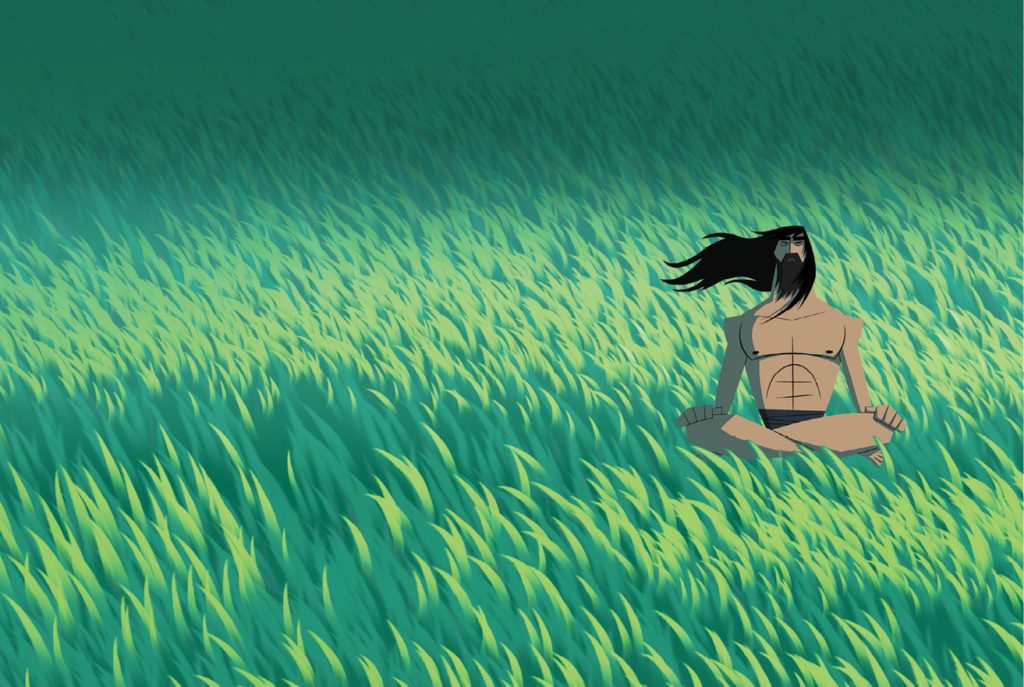
Samurai Jack (2001-2004; 2017)
Emmys Cred: 2 nominations and 1 win (2004) for Outstanding Animated Program; 6 more wins for Outstanding Individual Achievement in Animation
The titular character of this series was a samurai who travels back in time to defeat a shape-shifting demon and prevent a dystopian future. “Artistically, if you look at the show now, it’s pretty hard to compare anything else to it,” says Alvarez, who also worked on Samurai Jack. “I think it might have even set a path or opened the door for a lot of other shows, action-adventure type shows.”
When the series was revived in 2017 for one last season, Alvarez says creator Genndy Tartakovsky maintained the same processes as he used in the early ‘00s. “He didn’t do animatics. He slugged the boards just the way we used to slug the boards when we were directing them on the original series…everything was done on the storyboard,” he says. “For sound, we’d do the track on audio cassette. So it was just like doing the original show.”
Family Guy (1999-present)
Emmys Cred: 4 nominations for Outstanding Animated Program; 1 nomination for Outstanding Comedy Series (the first since The Flintstones); and an additional 12 nominations and 7 wins in other categories
Much like The Simpsons, Family Guy is about a middle-class American family. But the Griffins of Quahog, Rhode Island were a far cruder bunch, and the show was geared toward an older audience from the start. Like Beavis and Butt-Head, South Park, and other post-Simpsons shows, Family Guy gave (and continues to give) the Fox Standards and Practices department a workout.
Says Thompson: “Family Guy was much more outrageous than what The Simpsons had done. When The Simpsons came out, people thought it was going to be the end of civilization as we knew it. The Simpsons looks like a Sunday school lesson compared to what Family Guy would do.”
But that’s what Deborah Winslow, longtime Family Guy retakes director and current promotions director, loves most about the place where she’s worked for 14 years. “Nobody’s sacred. Nothing is safe. Equal opportunity: We’ll pick on everybody,” she says. “A lot of times people might take one thing and go, ‘Hey, this was mean to that group of people!’ Relax. We’ll get to everybody. It’s never anything personal. It’s good to laugh at yourself.”
SpongeBob SquarePants (1999-present)
Emmys Cred: 9 Primetime nominations since 2002; 6 Daytime nominations and 4 wins (the latest in 2018)

Paula Spence’s first job in animation was as a background artist during the first three seasons of SpongeBob SquarePants, the wacky, long-running kids show about a sponge that lives in a pineapple under the sea. She and her colleagues worked on the first episodes in a bubble, and were worried that by scheduling the show against the biggest animated series at the time—Pokémon—the network was signaling that it didn’t have faith in the series.
In fact, it was the opposite—and nearly 20 years later, SpongeBob has spawned multiple movies and even a Broadway musical. “He’s so quirky and fun and he’s everybody’s friend,” Spence says of the character’s appeal. “The kids just think he’s silly and love his antics and parents can sit back and enjoy just how crazy he is.”
Again, the sophistication level and the appeal for parents as well as kids is what pop culture expert Thompson credits for the series’ longevity. “This was designed for little children,” he says. “At the same time, any parent who happened to be in the room when they sat their kid in front of Spongebob SquarePants realized that there was so much more going on than just something for the 5-year-old.”
Take an episode called “The Paper,” about SpongeBob turning a gum wrapper discarded by another character into something beautiful. “Spongebob, who’s got a pure spirit, and a great imagination, and a critical mind, is able to turn this piece of garbage into the most delightful thing in the world. Whereas Squidward doesn’t have that ability,” Thompson says. “I think it’s one of the greatest episodes of television of all time—animation or otherwise. And it went less than 15 minutes.”
Bob’s Burgers (2011-present)
Emmys Cred: 4 nominations and 2 wins for Outstanding Animated Program; an additional 2 nominations
There’s a reason so many TV series —animated or live-action—focus on families: because people can see themselves in the characters. But unlike other animated series, Bob’s Burgers, about the Belcher family and their seaside burger joint, eschews crude humor for puns and sweet, genuine emotion about a happy family with two parents who love their three, very strange, wildly different children and don’t want to change a thing about them. And in a television landscape increasingly filled with antiheroes and heavy dramas, that’s a rarity.
“Unlike other primetime animated shows it’s not for adults only. It’s pretty family-friendly,” says director Chris Song. In fact, his own kids love the show —and it’s one series he’s worked on that his kids have been able to watch.
Says Thompson, “If the outrageousness of Family Guy was married to the innocence of SpongeBob, Bob’s Burgers is something of the offspring.”
